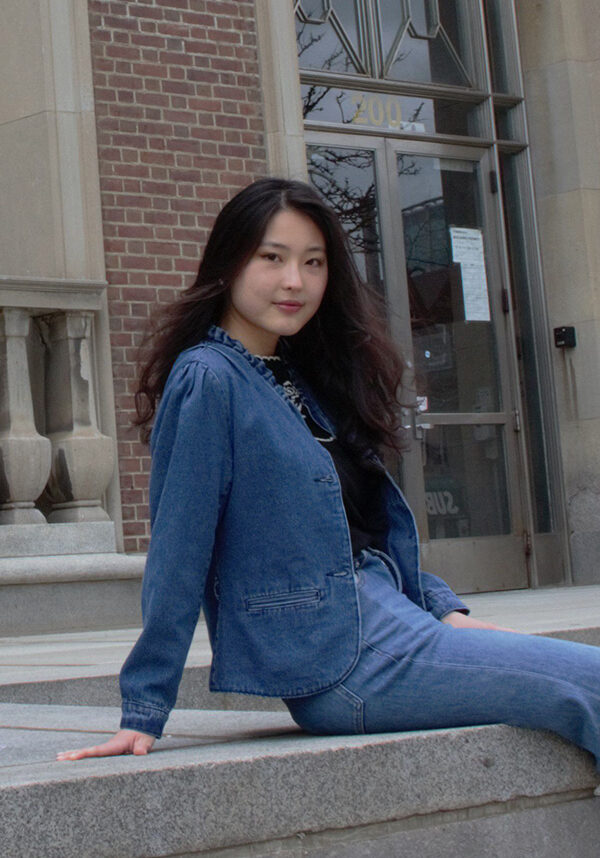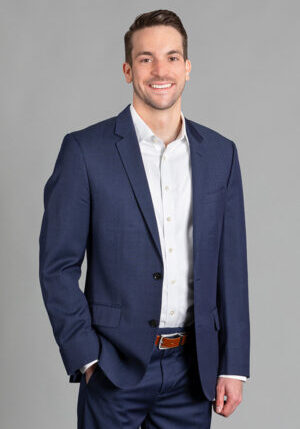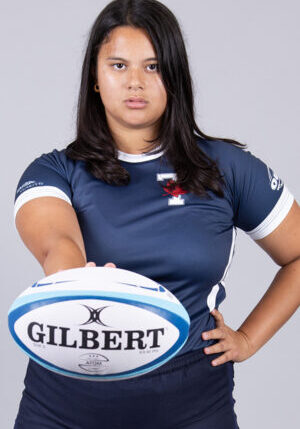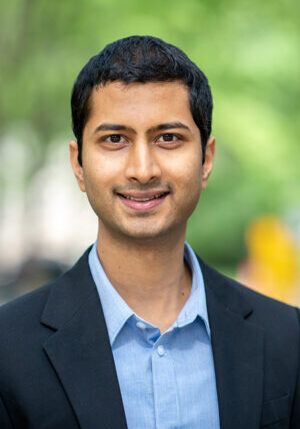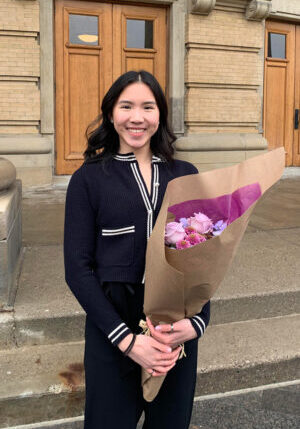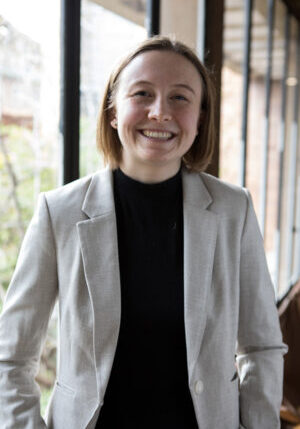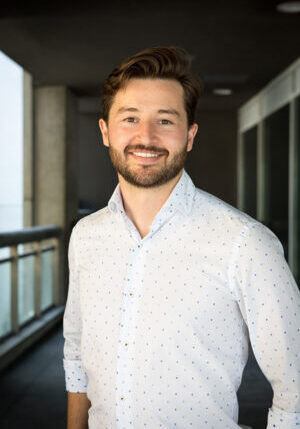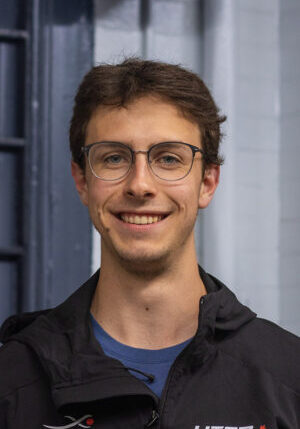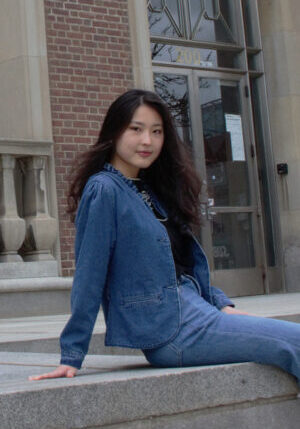GRADS TO
WATCH
2024
With U of T Engineering's convocation ceremonies on June 18, 2024, our students mark the end of one journey and the beginning of another.
Story by Safa Jinje & Rebecca Cheung
Having enriched the U of T Engineering community as undergraduate and graduate students, they will join our vibrant, global network of Skule™ alumni, where they will continue to address pressing challenges around the world and inspire the next generation.
This year’s 14 Grads to Watch — selected by their home departments and institutes — embody the spirit of U of T Engineering. Their stories illustrate the creativity, innovation and global impact that define our community. Watch their next steps!
MEET OUR GRADS
IMPROVING DRINKING WATER
Charles Balkenbusch (CivMin MASc 2T4)
Balkenbusch’s thesis project was on the occurrence and removal of microplastics across drinking water treatment facilities in North America.
“It is the first study to quantify the amount of microplastics to 2 micrometres in size present in drinking water at multiple facilities using a consistent analytical methodology — in our case, we used Raman spectroscopy,” says Balkenbusch, who worked under the supervision of Professor Robert Andrews (CivMin) and was also a member of the Drinking Water Research Group (DWRG) at U of T Engineering.
An international student from the United States, Balkenbusch spent three years as an assistant geologist in Kansas City before coming to U of T to pursue his master’s degree in civil engineering.
Balkenbusch made the most of his time at U of T, getting involved in campus life by joining the Civil and Mineral Graduate Student Association, where he was social chair. He was also the vice-president of finance for the Ontario Water Works Association, University of Toronto Student Chapter.
“My wife and I loved living in Toronto as there is always something great to do and to eat, and interesting people to surround ourselves with,” he says. “Being a 20-minute walk to the shore of Lake Ontario was definitely an added plus!”
Balkenbusch is now back in the U.S., working at Burns & McDonnell as a process engineer for both drinking water and wastewater. His experience at U of T has impacted his personal and professional life in many ways, he says.
“I used to dislike public speaking, but after having opportunities to teach a lecture-style tutorial for four semesters, to talk to high school students about water treatment, and to present at an international conference, I learned to enjoy being in front of a group of people," he says.
“The program helped me develop my voice and the confidence to share my ideas and opinions, and that will serve me well throughout my career.”
“I would like to thank Professor Robert Andrews for his continuous support and guidance, for giving me the opportunity to join the Drinking Water Research Group and to be able to help progress such impactful research, and for providing such a collaborative working environment; Husein Almuhtaram (CivMin postdoctoral fellow) for his continuous support and guidance; the entire DWRG group for making this experience so rewarding and fulfilling; and my wife Samantha Balkenbusch for her endless support."

TOWARD A GREENER FUTURE
Liane Catibog (MSE 2T2 + PEY)
“Throughout my time at U of T Engineering, I was never bored,” says Catibog. “There was always something new to learn, try or explore.”
Catibog squeezed in as many experiences as she could in the five and a half years of her undergraduate studies.
She was a varsity rugby athlete, serving as team captain in her final years at U of T — and even enrolled in an extra fall semester to play an additional season. She had a rewarding PEY Co-op experience with Litens Automotive Group. And outside the classroom and off the rugby field, she took time to explore her hometown of Toronto: from dining at new restaurants to catching comedy shows to visiting the city’s museums.
Looking ahead, she hopes to make the most of the opportunities presented to her at Kinectrics — an engineering consultancy specializing in power generation, transmission and distribution — which she joined in May.
“As energy demands continue to rise in Canada, stepping into the nuclear energy industry is exciting,” says Catibog. “I want to see what I can do to push Canada towards a greener future.”
Catibog plans to draw on the lessons she learned at U of T Engineering as she embarks on this new career path.
“I was asked recently if I could go back in time and choose any other university, would I still choose U of T. Without a doubt, I would choose it again and again,” she says.
“This place has given me so much more than an education. It has provided me with community, a partner, best friends, mentors and plenty of fond memories. My time at U of T Engineering has fundamentally shaped the person I am today, and I will always be eternally grateful.”
“I’d like to give a shout-out to my best friend, Isabella Ferrara (MSE 2T2 + PEY, MSE MASc student). I would not have been as successful in my studies without our extensive study sessions and her relentless support."
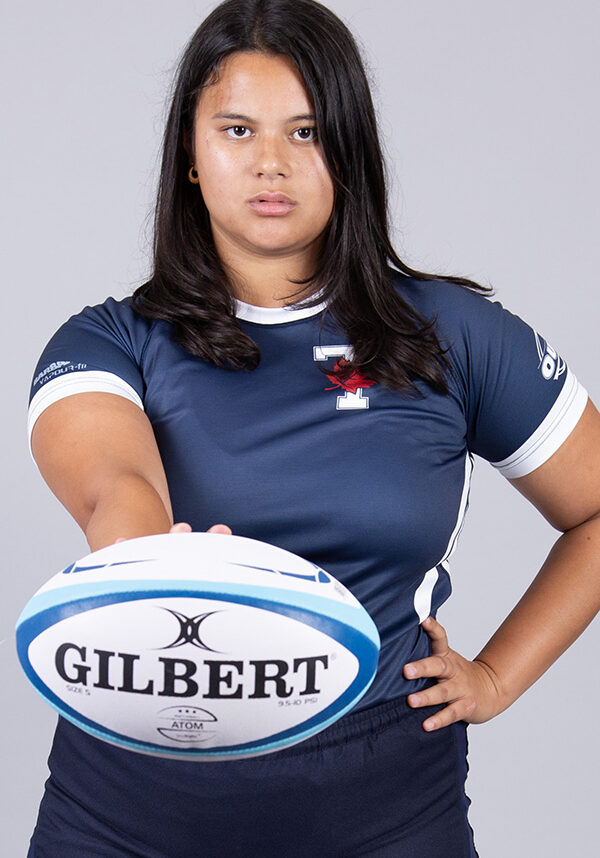
SURVEYING NEW GROUND
Grant Liao (MinE 2T3 + PEY)
Being a part of the U of T Engineering community has offered Liao boundless opportunities to explore his many interests, he says.
“I have worked on design teams, learned new languages, joined clubs tailored to my hobbies and interests, played intramural sports and developed engineering skills through immersive opportunities and relevant coursework,” he says.
One of his most enriching experiences as an undergraduate student in the Lassonde mineral engineering program was attending the Canadian Mining Games, where he led the team as co-captain in his final year.
“We were met with challenges that put our technical knowledge and practical skills to the test, while getting to meet future employers and fellow mining engineers across the country,” Liao says.
“Over four years, I ended up on the podium for five individual events. I am proud to have represented U of T.”
Liao was also the recipient of many scholarships, including the Canadian Mineral Industry Education Foundation Scholarship, the Lassonde Scholarship, the Jeffrey Skoll Scholarship, the WAMIC Wood Scholarship, an NSERC Undergraduate Student Research Award, the Frank Howard Guest Bursary and the Shell Canada Limited Engineering Scholarship.
A love for travel is one of many reasons Liao was drawn towards a career in mining.
“I've been fortunate enough to have worked for an international gold producer during my PEY Co-op, visiting Alaska, Nevada and Brazil while working on a variety of projects and developing my skills along the way,” he says.
“Looking forward, I am hoping to land a fly-in-fly-out engineering job within Canada. The flexible work rotation allows for time off to pursue my other interests in the mining finance space, either through technical writing or studying for a chartered financial analyst (CFA) designation.”
Until then, Liao will be taking a long overdue vacation to visit family in China and explore other countries in Asia.
“I'd like to thank Professors John Harrison and Sebastian Goodfellow (both CivMin) for initially exposing me to the Lassonde mineral engineering program as a TrackOne student, and again to John for later guiding me through my summer research term. If their seminars weren't so persuasive, I would have never discovered mining."
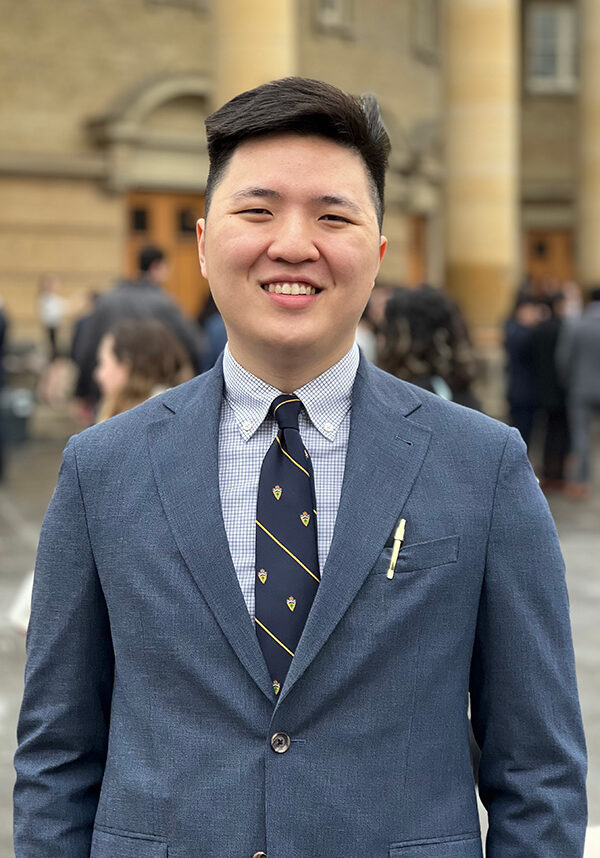
ENHANCING GLOBAL HEALTH
Selena Lombardi (IndE 2T3 + PEY)
“My time at U of T has been full of self-discovery,” Lombardi says.
Being a part of the Skule™ community has empowered Lombardi to explore new interests, while delving deeper into the topics that drew her to pursue industrial engineering.
As co-director of the brand growth and content team at You’re Next Career Network (YNCN), she supported U of T students on their professional development journey. She also collaborated on the team’s inclusivity and accessibility initiative, dedicated to enhancing professional development opportunities for underrepresented students.
As part of the U of T Varsity Blues dance team, she competed in three dance competitions each year against teams from Canadian universities. She also volunteers at the adaptive dance program at Canada’s National Ballet School.
“Dance was a big part of my life growing up, so being able to continue my artistic passions while studying was very important to me,” she says. “I dance up to seven hours per week rehearsing routines and taking classes.
“It may seem like a lot, but dance always gave me the much-needed break I sometimes needed away from studying.”
During her undergraduate studies, Lombardi worked as a summer research assistant at the Human Factors & Applied Statistics Lab, under the supervision of Professor Birsen Donmez (MIE). Her experience studying the effects of distractions in the surgical environment helped her develop the research and analytical skills required for her PEY Co-op role at the University Health Network’s Healthcare Human Factors.
This fall, Lombardi will begin a master’s of applied science at U of T under the supervision of Professors Enid Montague (MIE) and Joe Cafazzo, at the Dalla Lana School of Public Health. Her project will investigate the implementation of artificial intelligence and digital technologies to mitigate the effects of heart failure in Uganda.
“Throughout my degree, I have realized my passion towards solving global health development problems,” she says. “I now aspire to help develop equitable strategies, programs and policies for underserved communities to achieve their full health potential.”
“There are so many people that have helped shape me into the person that I am today, and I owe a debt of gratitude to them. This includes, but is not limited to: Professors Birsen Donmez, Enid Montague and Michael Gruninger (all MIE); my friends and classmates who have been by my side since first year; and members of YNCN and the U of T Varsity Blues dance team. Most of all, thank you to my family for believing in me through every rejection, failure, success and trial of my mental health journey. I will do my best to support others to achieve their best potential, just like you have done for me."

ACCELERATING MATERIALS CHARACTERIZATION
Rita Lyu (MSE 2T1 + PEY, MSE MASc 2T4)
Lyu’s time at U of T Engineering has been a colourful experience, she says, full of enriching lessons both inside and outside of the classroom.
After completing her undergraduate thesis under the supervision of Professor Jason Hattrick-Simpers (MSE), Lyu delved deeper into her project by pursing a master of applied science in Hattrick-Simpers's lab. Her work focused on the methodology development for X-ray Diffraction (XRD) analysis, which is a characterization method for understanding microstructures.
“The manual analysis of XRD data is a time-consuming human endeavour,” she says. “My thesis project was aimed at developing a physics-informed Bayesian model for XRD analysis. This tool is designed to be generalizable and could potentially help anyone who uses XRD for their materials characterization, such as reducing the resources and human biases during analysis.”
A highlight of Lyu’s graduate studies was being able to attend conferences, such as the 2023 Systematic Analysis of Errors and Uncertainty from Materials Modeling & Discovery to Manufacturing in Arlington, Va.
“I was able to present my work, and share and exchange ideas with other scholars,” she says. “It feels great when others recognize the potential of what I am doing.”
Lyu also enjoyed the vibrance of living in Toronto as an international student from China.
“I liked to visit art galleries, explore hiking trails, go to skateboard pop-ups, street dance competitions and ballet performances,” she says. “There is always something for everyone to do here.”
Now that Lyu has graduated, she is excited to take some time for herself before embarking on her first job as an MASc graduate.
“I want to travel and see more of the diversity of the world,” she says.
“My time at U of T Engineering has taught me to keep my head up, so that when opportunities arrive, they don’t appear to be impossible challenges.”
“I am very grateful to my thesis advisor, Professor Jason Hattrick-Simpers for the unwavering support and guidance throughout the journey. I also want to thank everyone in the AUTODIAL group who supported and motivated me. I would also like to thank all my friends I made during my time at U of T: You all made my experience meaningful."
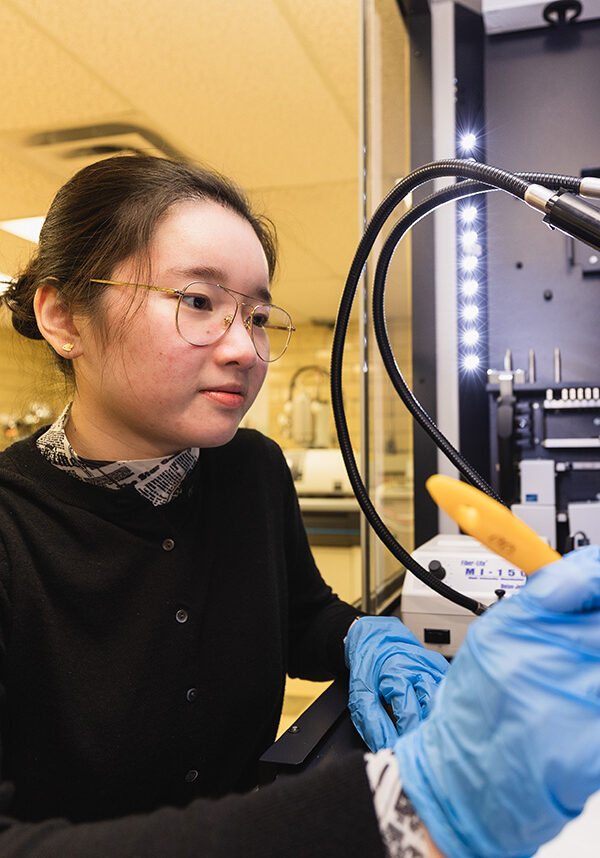
EXPLORING NEW HORIZONS
Sanjeev Narayanaswamy
(EngSci 1T5 + PEY, UTIAS PhD 2T4)
An explorer at heart, Narayanaswamy devoted his doctoral thesis to studying different ways of designing trajectories that use fuel-efficient electric spacecraft propulsion systems, known as ion thrusters, for planetocentric and interplanetary missions.
“One highlight of my research was developing a novel control law for low-thrust rendezvous, called the RQ-Law, that has applications for space debris removal, satellite servicing and in-space assembly,” he says.
The idea behind this work — which was supported by the Ontario Graduate Scholarship and the Kenneth M. Molson Fellowship — was declared the winning solution for the NASA FDL Orbital Debris Remediation Challenge. Beyond this, Narayanaswamy’s research adds to the massive body of work aimed at enhancing space flight and exploration.
Complementing his research program with enriching extracurricular activities, Narayanaswamy served as a judge for U of T Engineering’s Undergraduate Research Day and Space Design Contests, and he took on reviewer responsibilities for the AIAA Journal of Guidance, Control, and Dynamics.
Though he is well-travelled — he grew up in India and the United States before his family settled in Toronto — Narayanaswamy is looking forward to staying put in the city for the foreseeable future. He recently transitioned into a full-time position at U of T’s Space Flight Laboratory, working with the Guidance, Navigation and Control Group.
“Through the rigorous education I received from U of T Engineering, I gained valuable insights and learned from world-renowned experts who have invested a lot of time and effort in their fields. In addition, through this process, I learned a lot about myself.”
“I am grateful to my PhD supervisor, Professor Christopher J. Damaren (UTIAS), for his outstanding mentorship and support, dating back to my EngSci days, and to Professor Robert E. Zee (UTIAS) for his encouragement and for giving me a career in the Space Flight Laboratory, where I get to design trajectories and fire thrusters on real spacecraft. I’d also like to recognize the members of the Spacecraft Dynamics and Control Laboratory and the Space Flight Laboratory for creating such a welcoming environment along with the entire UTIAS community. Finally, I would like to thank my family."

STEPPING UP AS A LEADER
Erin Ng (ChemE 2T3 + PEY)
Ng has earned more than a degree from U of T Engineering; she acquired the self-assurance to take on whatever challenges might come her way.
“Going through this rigorous program has shown me what I'm capable of,” she says. “I’ve learned how to adapt and work effectively as part of a team. And I’m more comfortable approaching professors and experts with questions."
She was a varsity figure skater during all five years of her undergraduate studies — including during her PEY Co-op at Sanofi — and she rose to the ranks of team captain.
“I feel like I’ve come full circle with skating. I’m lucky to be in a position where I can mentor younger skaters, in the same way older skaters looked out for me when I was starting out,” says Ng, who received a U of T Student Leadership Award earlier this year.
Ng also made her mark as the professional development director for U of T’s student chapter of the Canadian Society for Chemical Engineering. In her two years in this role, she led the planning for the group’s national conferences in Vancouver and Calgary, helping students better understand the field of chemical engineering and what they could accomplish with a degree.
Pursuing a summer research project at ETH Zurich and an undergraduate thesis project with Professor Levente Diosady (ChemE) opened Ng’s eyes to the enriching world of academic research. This fall, she’ll be starting a master of applied science at U of T Engineering, under the supervision of Professor Frank Gu (ChemE).
“As I reflect on what it means to work in the field, I know I want to make meaningful and important contributions through my work, without ever losing sight of my duties as an engineering professional.”
“I’d like to thank the U of T varsity figure skating team for being the rock of my university experience and to the Canadian Society for Chemical Engineering for the amazing opportunities to build my leadership capacity. I’d also like to thank Professor Diosady for giving me a great opportunity to work in a research environment. Finally, I'd like to give a special shout-out to my best friend Audrey Dessureault (ChemE 2T3 + PEY) for being my voice of reason and supportive friend over the past few years."
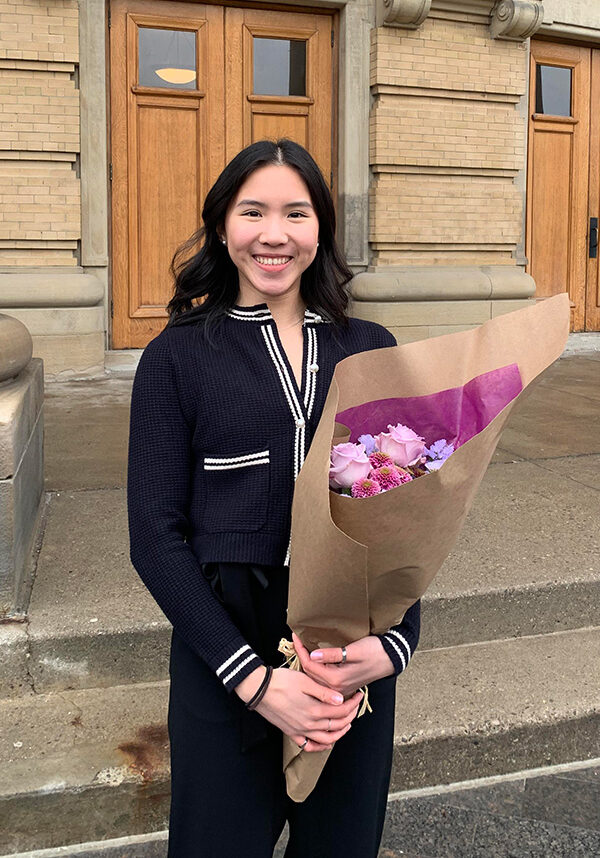
ADVANCING CANCER TREATMENTS
Maneesha Rajora (BME MASc 1T3, BME PhD 2T4)
Rajora’s PhD thesis project was motivated by the lack of curative treatment options available for glioblastomas, an aggressive brain cancer.
“These cancers are complex and one of the reasons that treating them is so difficult is that they grow rapidly and diffusively into normal brain tissue, making it nearly impossible to remove tumors completely without harming normal brain tissue,” she says.
“Beyond surgery, other conventional therapies like chemotherapy and radiation therapy have limited efficacy due to the existence of treatment resistant cancer cell populations.”
Her research, which was supervised by Gang Zheng (BME), a professor in the department of medical biophysics and the Institute of Biomedical Engineering, focused on the development of new materials that can better deliver drug treatments to the brain. This work also offers promising pathways to treating other cancers and neurological disorders, such as Alzheimer’s and pancreatic cancer.
“I invented nanomedicines and explored their combination with new ultrasound microtechnology platforms to advance the delivery of light-activatable drugs with promising cancer therapy capabilities, but which are otherwise unable to reach glioblastomas,” says Rajora, who pursued her PhD as part of a collaborative MD/PhD offered jointly by the Temerty Faculty of Medicine and the School of Graduate Studies.
“This could potentially open new avenues for brain cancer therapy, which are now being further explored with the ultimate aim to improve surgery and therapy outcomes.”
Now that she has completed her PhD, Rajora will continue in the MD program to complete her medical training.
“My time with U of T Engineering has provided me with many learnings I will take into my future endeavours and medical training,” she says. “I learned more about how to engage in mentorship, collaboration, leadership and research, and the importance of such engagement through a lens of equity and inclusion.
“I hope to combine these broader teachings with my own experiences as a scientist with disability and chronic illness to provide inclusive and supportive patient-centred care, partner in advocacy, lead clinically inspired research and engage collaboratively with medical teams in the future.”
“It truly takes a village of support to complete a doctoral thesis. It is difficult to choose one person or group at U of T I’d like to thank, because everyone, including my supervisor, mentors, colleagues, fellow students, family, family of friends, program administrators and funders had an integral role in shaping my journey. If I had to thank only one group at U of T it would be my fellow ‘Gangsters’ in the Zheng lab. I am profoundly thankful to have trained in such a supportive environment and created such meaningful relationships that extend well beyond my graduate training."
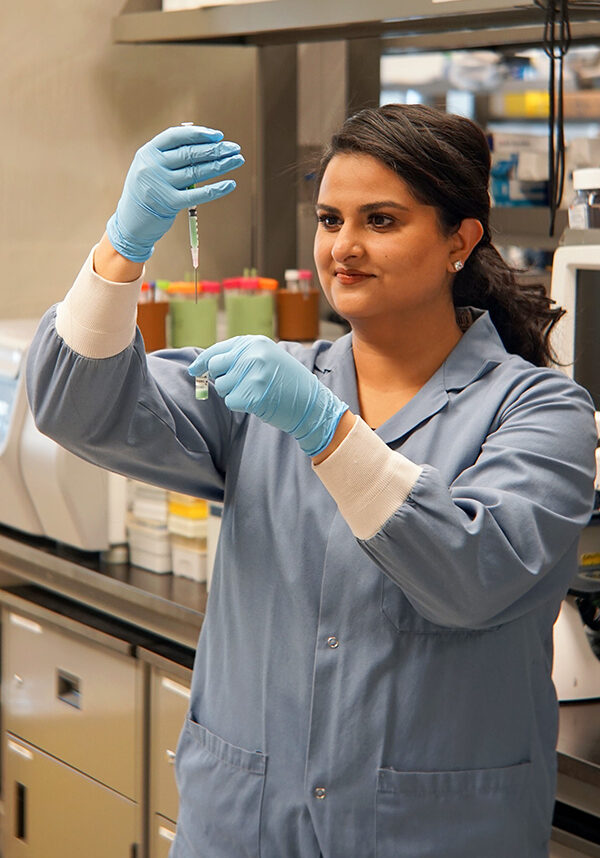
STRENGTHENING OUR COMMUNITY
Joanna Roy (EngSci 2T3 + PEY)
From the start of her undergraduate studies, Roy’s peers knew she would be a great leader. Time and again, she proved them right.
After a productive first year working with Engineers Without Borders (EWB), where she co-founded its food bank project, Roy took on more leadership positions with the group, eventually becoming president.
She also championed other important causes, including overseeing key initiatives and events as project director for Skule™ Mental Wellness, serving as a student advisor for the U of T-wide Inlight Student Mental Health Research initiative and taking on the position of F!rosh Week orientation chair for U of T Engineering’s Orientation Committee (OC).
“Throughout my time at U of T Engineering, there was a recurring pattern of people believing in me and pushing me to lead and accomplish things, even at points when I didn’t necessarily believe in myself,” says Roy, who honed her leadership skills by completing the Troost Institute for Leadership Education in Engineering (Troost ILead) Summer Fellowship.
“It just goes to show you how supportive and empowering this community can be.”
This summer, Roy, who was named valedictorian of the 2T3 + PEY and 2T4 classes, will be contributing her leadership and technical knowledge to the Third Space Research Group and Inlight. After that, in the fall, she’s headed to Germany to advance projects in artificial intelligence (AI) ethics with Trail ML, an AI governance co-pilot.
While Roy's undergraduate experience has prepared her well for this next chapter and future endeavours, she also credits the guiding influence of her father, an engineering professional who passed away in 2023.
“He valued integrity, respect and humility. While he took his work seriously, he always looked for ways to inject a bit of fun and to lighten the mood,” she says. “I attribute a lot to him, in terms of who I am, and how I lead.”
“I got a lot of support from my mom, too,” she adds. “She always says ‘feel the fear but do it anyway.’ That’s what I try to do.”
“I want to thank everyone at Engineers Without Borders, Skule™ Mental Wellness, and the F!rosh Week team. And I want to give shout-outs to: Milan Maljkovic (ECE 1T6 + PEY) and Vivian Trumblay from ILead, Rhonda Meek from EngSoc, Emma McCann from Inlight, the Third Space Research Group, and Julie Kang, Stephen Johns and Irma Bernardi for being the best OC and EngSci cheerleaders. And, finally, my friends, my mom and my dad for being there for me."

LEARNING AT A HIGHER LEVEL
Angel Serah (CompE 1T7 + PEY, ECE MEng 2T4)
In the span of few short months, Serah completed her master of engineering, successfully passed her P.Eng licensing exam and got married — all while balancing a full-time career.
How did she do it? Finding the fun in all the busyness was a big part of it.
“The MEng was the fun part; I really looked forward to going to class,” says Serah, a senior silicon design engineer at AMD.
“I got the best of both worlds. From my job, I understood the industry and what goes into a product release. And from the MEng, I learned more about the research side and what’s actually happening inside computers, on a hardware level.”
In addition to exploring concepts in class and through readings, she teamed up with members of Professor Natalie Enright-Jerger’s (ECE) computer architecture group to complete a project on sustainable computing. Together, they researched and put forth new ideas on how to reallocate degraded but functional graphical processing units to cut down on waste.
Ultimately, the past two years have shown Serah the importance of continuous learning. And she’s learned that she’s capable of taking on complex subject matter.
“It’s been an eye-opening experience,” she says. “With the MEng, and with the volume of material you are constantly tasked with reading, reviewing technical papers every day becomes normalized. Now, I really enjoy diving into research papers and getting into the technical details.”
“Overall, I feel more confident consuming journal articles, presenting a few of my own suggestions and pursuing new opportunities — including a few patents.”
“I’d like to give a shout-out to Professor Natalie Enright-Jerger's computer architecture group. They were extremely collaborative and always willing to accommodate my busy work schedule so that we could meet and work together as a group."

BUILDING SMALLER, STRONGER
Peter Serles (MIE MASc 1T9, MIE PhD 2T4)
Serles’ research in nanomechanics and nanomaterials took on many shapes during his time at U of T.
“The crowning piece of my thesis was using machine learning combined with nanoscale 3D printing to design a material that weighs as much as Styrofoam but has the strength of structural steel,” he says.
The versatile applications of this work brought Serles to South Korea, where he collaborated with the Korean Advanced Institute of Science and Technology. He also held two visiting scientist positions at Rice University in Houston, Texas, and in Lyon, France, working with the French Space Agency.
Serles was the recipient of a Vanier Canada Scholarship and a Connaught PhD for Public Impact Fellowship, and he will receive the Canadian Society for Mechanical Engineering PhD Gold Medal at convocation. He was also recently recognized for his leadership and volunteer service, which included his contributions as the only graduate student representative on the President’s advisory committee for the appointment of Vice-President and Provost of the university.
Still, it was his experiences as a course instructor for an undergraduate mechanical engineering design course that helped cement his ambition for the future.
“It was a really rewarding experience to work with a class of 200 students and see the way certain concepts clicked in their minds as they progressed through the term,” he says. “I would love to continue my career in academia. I love research and love teaching in parallel.”
This summer, Serles, will begin his postdoctoral research at the California Institute of Technology, where he will work under the supervision of Professor Julia Greer. The position is supported by a Schmidt Science Fellowship, for which Peter was one of 32 fellows selected worldwide.
“The Schmidt fellowship lets me be ambitious and high-risk, so I plan to pivot into the biomedical and neuroscience space and use my expertise in nano-scale 3D printing to build scaffolds that stem cells can grow on,” Serles says.
“My goal is to build up my expertise in entirely new areas that I can bring back to Canada when I pursue a professorship.”
“I want to thank my supervisor, Professor Tobin Filleter (MIE), for being a mentor and a friend through six-and-a-half, very challenging years. We've gone out to eat new things in South Korea together and we were at a conference when the Raptors won the NBA championship. We've had many awesome experiences and it’s been such a great opportunity to get to work with and learn from him."

ENHANCING ELECTRICAL TECHNOLOGIES
Jake Sprenger (ElecE 2T3 + PEY)
For Sprenger, the past few years have been about pushing the limits of what’s possible.
“Throughout my degree, I was constantly being challenged and my horizons were continually expanding,” says Sprenger, who balanced his rigorous course load with two seasons of varsity baseball.
“Every time I learned a new concept or idea, I’d realize that there was another idea that extended upon it, and another idea that extended upon that one. It made me see how much there is to explore.”
His U of T Engineering experience certainly got off to a flying start. Before he had stepped into a university classroom, he joined the U of T Formula Racing (UTFR) team and participated in their summer workshop.
Sprenger was instantly hooked.
In his second year, he became the steering system design lead. After that, he served as team captain, leading the design and development of UT22, the team’s first fully electric vehicle. And now, with Sprenger as this season’s electrical technical director, UTFR finished first in the recent Formula SAE race in New Hampshire.
“Being a part of the UTFR was a transformative part of the degree. I would be a very different person if I hadn't joined the team,” says Sprenger.
Eager to explore new circuits, Sprenger headed to the U.K. for a PEY Co-op opportunity with Jaguar TCS Racing. There, he gained first-hand experience in the design and development of fully electric vehicles for Formula E.
Now that Sprenger has a comfortable handle on electric vehicles and racing, he’s looking forward to his next challenge: space. This summer, he’s headed to Space X, where he’ll be working in power electronics and supporting the group’s upcoming collaborative missions to the moon with NASA.
“I’m not sure where the path will lead, but I want to contribute new ideas and develop new technologies that both push the world forward and get people excited.”
“I definitely want to thank the U of T Formula Racing Team for the opportunities that they've given me. I’d also like to give a shout-out to my brother and sister. They both studied at U of T and accomplished amazing things. It's been great to see them succeed and excel in their fields."

DRIVING INNOVATIVE SOLUTIONS
Chetachi Ugwu-Ojobe (EngSci 2T3 + PEY)
Ugwu-Ojobe looks back at his undergraduate studies at U of T Engineering as years of transformation.
“Coming from Nigeria, from the other side of the world to Toronto as an international student, there are a lot of experiences that I’ve had here that I could have never had back home,” he says. “Throughout my engineering experiences, I found myself continuously surpassing my limits and changing the way I think.
“The person I was back in first year is completely different from the person I am today.”
Along with his studies, Ugwu-Ojobe immersed himself in extracurricular activities, including gaining practical experience as part of University of Toronto Aerospace Team’s Unmanned Aerial Systems division. He was also a past president of the U of T chapter of the National Society of Black Engineers (NSBE).
“I also served as a representative for the East Canada chapters of NSBE — U of T, TMU, McGill, Ontario Tech, McMaster, Waterloo — on the national board of NSBE,” he says. “In my capacity as chapter president, I was responsible for organizing the NSBEHacks 2022, the first student-run Black hackathon in the GTA.
“NSBE overall allowed me to form a community with Black students at the University of Toronto, which I think was vital to my success at this school.”
After graduation, Ugwu-Ojobe will be moving to Vancouver to work at Microsoft as a software engineer in the Windows and Devices branch. But in the long term, he aspires to become an entrepreneur working on artificial intelligence innovations and solutions.
“Thanks to the rigorous engineering science program, I’ve learned to handle a workload that will allow me to succeed in any environment,” he says.
“I would like to shout out the EngSci 2T3s: struggling and persevering alongside them these past five years has been great and I owe a lot of this degree to them. I would also like to thank NSBE for providing me with a community of like-minded individuals and allowing me to contribute so much to the community. Lastly, I want to shout out my parents for supporting me through my education — both financially and emotionally."

TRANSFORMING WATER TREATMENT
Yuxin (Sindy) Zhang (ChemE MEng 2T4)
Some students might wade into complex water treatment research, but Zhang dove right in.
Passionate about water treatment technology and the accessibility of clean water, she sought out research projects and potential supervisors as soon as she started her master of engineering program.
“When you think about it, water is the most important aspect of our daily lives,” says Zhang, who pursued an emphasis in Advanced Water Technologies. “I knew I wanted to work on a project related to water quality and treatment.”
Over the past two years, under the supervision of Professor Jay Werber (ChemE), she studied the potential role of polydimethylsiloxane in extracting medium-chain fatty acids from organic waste.
“Fatty acids have important industrial purposes in biofuel production, medical applications and lubricants, yet so much of it is disposed in organic waste,” she says.
“It’s exciting to see if there might be ways to recover them and unlock their potential.”
Wrapping up this project and preparing her findings for publication in a peer-reviewed journal is a fitting way to cap off her MEng experience.
For Zhang, her U of T Engineering experience has been transformative. She describes the opportunities to visit water treatment plants, speak with alumni and meet with professionals in the industry as game changing.
Following convocation, Zhang, who is an international student from China, is looking forward to returning home to reconnect with loved ones. After that, she’s hoping to pursue work in consulting, working in water treatment technologies.
The lessons she learned at U of T Engineering will certainly serve her in future endeavours.
“The environment at U of T pushed me to think in ways I've never thought before. Being here has taught me how to stretch my abilities and ways of thinking to solve problems."
“I would like to thank my supervisor, Professor Jay Werber, for his patience and support. He has been an excellent mentor and teacher and has always helped guide me in approaching and thinking through problems."
